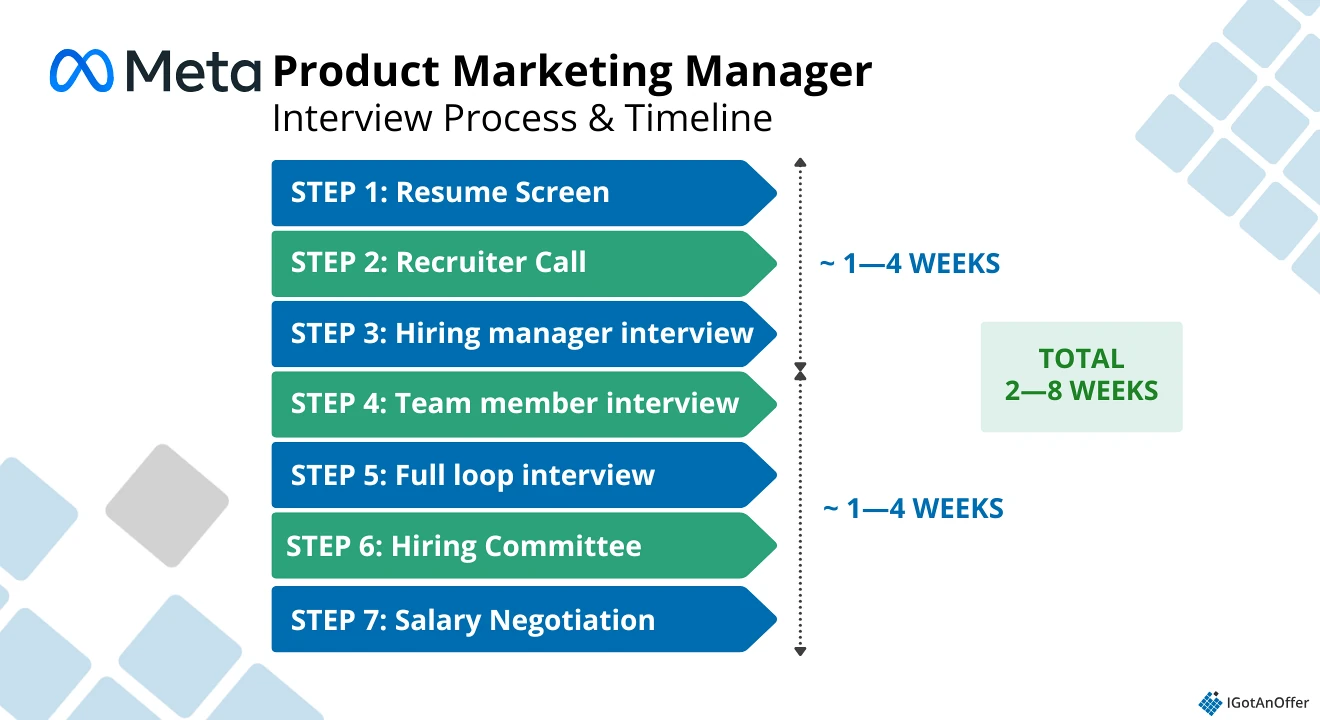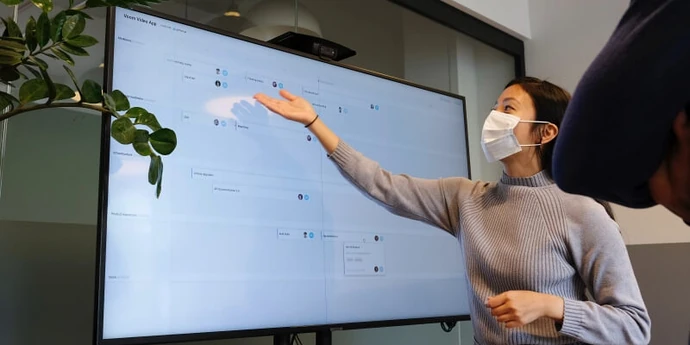Product Marketing Manager (PMM) interviews at Meta are really challenging. The questions are difficult, specific to Meta, and cover a wide range of topics.
The good news is that the right preparation can make a big difference and can help you land the job. We have put together the ultimate guide to Meta's PMM interviews below to help you maximize your chances of success.
Here's an overview of what we’ll cover:
Click here to practice mock interviews 1-on-1 with PMM ex-interviewers
1. Interview process and timeline

What's the Meta product marketing manager interview process and timeline? From start to finish, the process can take anywhere from 2-8+ weeks and it follows these steps:
- Resume screen
- Recruiter phone screen
- Hiring manager interview
- Team member interview (in some cases)
- Onsite interviews (typically includes 4-5 interviews)
Let's look at each of these steps in more detail below:
1.1 Resume screen
First, recruiters will look at your resume and assess if your experience matches the open position. This is the most competitive step in the process, as millions of candidates do not make it past this stage.
If you’re looking for expert feedback on your resume, you can get input from our team of ex-FAANG recruiters, who will cover what achievements to focus on (or ignore), how to fine tune your bullet points, and more.
1.2 Recruiter phone screen
In most cases, you'll start your interview process with Meta by talking to an HR recruiter on the phone. They are looking to confirm that you have a chance of getting the job at all, so be prepared to explain your background and why you’d be a good fit at Meta. You should expect typical behavioral and resume questions like, "Tell me about yourself", or "Why Meta?".
When you get past this first HR screen, the recruiter will then help schedule your first “real” PMM interview. One great thing about Meta is that they are very transparent about their recruiting process, and the recruiter will likely walk you through your next steps at this time.
1.3 PMM hiring manager interview
Next, you’ll speak with the hiring manager over the phone or on a video conference call. This call is usually 30 mins, and the types of questions you'll be asked are similar to what you’d encounter during the onsite interviews.
Be prepared to cover go to market strategy, your ability to influence others, and questions related to the specific role for which you’ve applied. We’ll dig further into these topics in the onsite interview section below.
During this initial interview, the hiring manager is evaluating whether your application is promising enough to bring you onsite. To do this, your interviewer will assess whether there are any areas where you are particularly weak, which would cause you to miss the hiring bar.
1.4 PMM team member (peer) interview
Not all candidates will go through this step, but sometimes you’ll be asked to do an additional interview with a PMM team member. This could be added to the interview process if the hiring manager isn’t confident enough in your application yet to invite you to the onsite interviews, or if they just want to get another opinion.
By having you interview with a PMM (who will probably be a senior member of the team), the hiring manager is able to gather an additional data point. During this interview, the PMM might ask you similar questions as the hiring manager, or they might drill-down into a particular focus area.
1.5 PMM onsite interviews
When you make it to this step, get ready, because the onsite interviews are the real test. You'll typically spend a full day interviewing with Meta and each interview will focus on one of the following areas:
- Inbound marketing, which is focused on bringing IN insights from the market to determine what customers need or want. This might come in the form of customer interview data analysis, market analysis, etc. To evaluate your inbound marketing skills, Meta uses a presentation style interview, where you are evaluated on your knowledge, analytical skills, and communication skills. More on this interview in section 3 below.
- Outbound marketing, which is focused on optimizing how the product performs when it's taken OUT to the market. This type of interview will evaluate you on go-to-market strategy, and will typically include case examples or “tell me about a time…” style questions.
- Relational skills, where you are evaluated using behavioral questions that focus on your ability to influence others and your ability to bring something to market by working cross-functionally
- Role specific knowledge, where you are evaluated on your domain knowledge through more specific questions like “what are advertisers looking for in X…” (where X is the relevant product or functional area)
In some cases, Meta has also been known to ask PMM candidates to do case study or brain-teaser style questions. For example, you may get asked a question where you have to estimate a large number, like “how many bicycles are there in San Francisco?”
[Interviewing during Covid-19] As of the writing of this article, we believe that Meta's PMM interview process, that we've summarized above, is largely the same during the Covid-19 pandemic. However, Meta has transitioned interview steps that would normally be held in-person, to virtual. If you want to learn more about how your interviews will be handled, your recruiter from Meta should be able to answer your questions during your initial phone call.
2. What Meta PMMs Do
Before we dig deeper into each of the interviews you’ll face, we thought it would be helpful to briefly cover how the PMM role operates at Meta. This will help you speak more intelligently about the role and how you will work with other people within Meta. Plus, it’s also a good idea to know what you’ll be getting into!
Meta has published a couple of articles that capture the personal experiences of PMMs and the type of work that they do day-to-day. For example, we’d recommend reading the interviews with Goksu and John. From these interviews, you’ll see that PMMs at Meta:
- Identify market opportunities and customer needs
- Analyze data to inform strategy decisions
- Work cross-functionally (i.e. with PMs, Engineers, etc.) to develop new products
- Drive market positioning for the launch of new products
- Identify improvements to make existing products even better for customers
Keep these activities in mind as you begin to think more about the role, and also as you start preparing your answers for Meta’s interview questions.
3. Example questions
As we mentioned above, the interviews you’ll face for a Meta PMM role, can be roughly divided into the following four interview types:
- Inbound marketing
- Outbound marketing
- Relational skills
- Role specific knowledge
Below we’ll dig into each of these in more detail.
3.1 Inbound marketing
The inbound marketing interview is a 1-hour presentation that you'll prepare in advance, and bring with you into your onsite interviews. You can think of the presentation as an analysis you might bring to your team, or leadership, within Meta. You can expect to get the prompt 2-3 days (or as long as a week) before your interviews.
The prompt you’ll receive is usually a real business problem. For example, “would you recommend going into market X?” And you’ll need to analyze the problem and create a PowerPoint to help you deliver your presentation. This is a really big part of the interview process, so if you want to land an offer, you’ll need to plan in advance to make sure you have plenty of time to prepare an excellent presentation.
Here are a few examples of inbound interview questions. The first example is from Glassdoor, we heard the second one from a former Meta PMM, and the rest were written by our team to provide additional practice materials.
Meta PMM interview questions - Inbound marketing
- “If you were to launch a new Facebook advertising product in Indonesia, how would you do it?”
- “How would you enter the automotive market with a new product?”
- How would you increase your customer lifetime value (CLV), among ecommerce advertisers?
- How would you launch a new product in the real estate market?
- How would you identify an opportunity for a new product in an established market?
3.2 Outbound marketing
Outbound marketing interviews focus on go-to-market strategy, including topics like market positioning, advertising campaigns, and user adoption. To evaluate your experience and skills in these areas, your interviewer might ask you “tell me about a time” style questions, or they might pose hypothetical business scenarios and ask you how you would approach them.
Here are some examples of outbound interview questions that were reported in Meta PMM interview reports on Glassdoor:
Meta PMM interview questions - Outbound marketing
- “What would be your process in taking a new product to market?”
- “Describe a successful marketing campaign you developed and why it was successful.”
- “Pick a physical product that you really like in the real world. Articulate the value proposition for me. What segments does it target? What's an example ad campaign you might come up with to market it?”
- “What is an advertising campaign that you found effective recently?”
- “How would you improve x product”
3.3 Relational skills
The main job of a PMM is to be the voice of the market, and a big part of that is building and managing relationships within Meta. During relational interviews, you'll be assessed using behavioral interview questions with 2 main focuses: influence and how you would take something to market.
Since your ability to influence others and to successfully bring a product to market will require you to work across various teams, this type of interview will also evaluate your ability to work cross-functionally.
Here are some example questions that were reported in Meta PMM interview reports on Glassdoor:
Meta PMM interview questions - Relational skills
- “Tell us about a time you had to use influence to complete a project?”
- “Describe a role you held where you had to influence the software or UI and what you were able to accomplish.”
- “Tell me how you would hold the line and push back against leadership”
- “Give me an example of some difficult cross-functional relationships you've had, and how you managed them.”
- “How would you market X feature to the application developers, given you have limited time/resources?”
3.4 Role specific knowledge
Finally, role specific knowledge interviews evaluate candidates on their “domain knowledge” related to the role for which they’ve applied. Unlike some roles, Meta PMMs are usually not generalists and are hired for a specific function.
For example, if you apply for a PMM role focusing on Facebook ecommerce ads, then you’re likely to get questions related to ecommerce advertising during a role specific interview.
Here are some example questions that were reported in Meta PMM interview reports on Glassdoor:
Meta PMM interview questions - Role specific knowledge
- “I assume you've used product X (product I'd be working on)? What are some strengths & opportunity areas that you see?”
- “What would you do to improve the Facebook Login product (Platform side)?”
- “What are advertisers looking for from online advertising?”
- “Let's explore business issue X together. What kind of framework would you come up with to structure the problem, and then prioritize the opportunities?”
- “What are the biggest challenges marketers face today?”
4. How to prepare
Now that you know what questions to expect, let's focus on how to prepare. Here are the four preparation steps we recommend, to help you get an offer as a Meta product marketing manager.
4.1 Learn about Meta
Most candidates fail to do this, but before investing a bunch of time preparing for an interview at Meta you should take some time to make sure it's actually the right company for you.
Meta is prestigious, so it's tempting to ignore this step completely. But, the prestige in itself won't make you happy day-to-day. It's the type of work and the people you work with that will.
If you know any PMMs, engineers, or PMs who work at Meta (or used to) it's a good idea to talk to them to understand what the culture is like. In addition, we would recommend reading the following:
- Meta's 6 core values
- Facebook’s hacker culture (by Mark Zuckerberg, via Wired)
- Meta annual reports and strategy presentations (by Meta)
- Meta's approach to tech trends (by CB Insights)
- Meta org culture analysis (by Panmore Institute)
- Meta fact sheet (by IGotAnoffer)
4.2 Practice by yourself
As mentioned above, you'll have four types of PMM interviews at Meta: inbound marketing, outbound marketing, relational skills, and role-specific knowledge. Here are some things you can do to prepare for each one by yourself.
For inbound marketing interviews, you’re going to need to make and deliver a presentation. To prepare, we’d recommend that you actually create a PowerPoint and practice delivering your presentation out loud. Use the example questions in section 3.1 above as a starting point, and practice in a way that matches the real process as closely as possible (for example, limit yourself to 2-3 days to create the presentation).
For outbound marketing interviews, we recommend that you prepare a couple of “stories” from your past work experiences (or industry examples) related to developing a go to market strategy. Good stories will quantify the impact you had, and will demonstrate how you’ve approached past marketing challenges. When you have a story in mind, you can test it by asking yourself questions like the ones in section 3.2 above.
For relational skills interviews, you should prepare for typical behavioral interview questions, and we recommend that you read our guide on behavioral interviews. In addition, you’ll want to specifically prepare for questions about your ability to influence others. This is another place where it’s helpful to prepare “stories” from your past experiences.
For role-specific knowledge interviews, you’ll need to do some homework on the role and functional area for which you’ve applied. For instance, if you’re applying for a PMM role focusing on Facebook’s e-commerce ads, then you should spend some time learning (or reminding yourself) about that business. Do some online research, and try to talk to people familiar with the business to learn more.
It's a great idea to practice each of these interview types out loud. This may sound strange, but it will significantly improve the way you communicate your answers during an interview.
However, practicing on your own has its limitations. You can’t simulate thinking on your feet or the pressure of performing in front of a stranger. Plus, there are no unexpected follow-up questions and no feedback.
That’s why many candidates try to practice with friends or peers.
4.3 Practice with peers
If you have friends or peers who can do mock interviews with you, that's an option worth trying. It’s free, but be warned, you may come up against the following problems:
- It’s hard to know if the feedback you get is accurate
- They’re unlikely to have insider knowledge of interviews at your target company
- On peer platforms, people often waste your time by not showing up
For those reasons, many candidates skip peer mock interviews and go straight to mock interviews with an expert.
4.4 Practice with experienced PMM interviewers
In our experience, practicing real interviews with experts who can give you company-specific feedback makes a huge difference.
Find a Meta product marketing manager interview coach so you can:
- Test yourself under real interview conditions
- Get accurate feedback from a real expert
- Build your confidence
- Get company-specific insights
- Learn how to tell the right stories, better.
- Save time by focusing your preparation
Landing a job at a big tech company often results in a $50,000 per year or more increase in total compensation. In our experience, three or four coaching sessions worth ~$500 make a significant difference in your ability to land the job. That’s an ROI of 100x!















